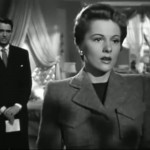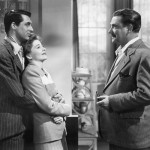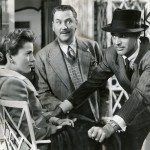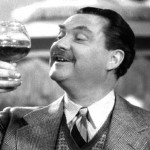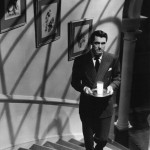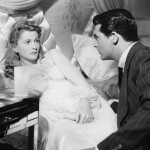
Suspicion – 1941
Alfred Hitchcock does it again. This time he does it with Carey Grant and Joan Fontaine playing his two leads, Johnnie Aysgarth and Lina McLaidlaw. He is a rich, handsome, young, playboy who has never worked a day in his life. She is a well brought up, but sexually repressed young lady. When the two of them meet, sparks fly and the quick marriage that follows starts off wonderfully. But then, the cause of many failed marriages, money, rears its ugly head, specifically, the fact that he has none.
Johnnie only knows how to live on borrowed money, building up sizeable debts and sometimes resorting to criminal behavior like embezzling from his cousin. He also has a reputation as a compulsive gambler, a fact that Lina only learns after their vows are taken. He knows how to spend money, but not how to earn it. They start having financial problems almost immediately. But this was the 1940s, and a woman would never leave her husband for such a paltry thing. Never-mind the fact that he betrays her, lies to her, treats her horribly, and has no respect for her or her parents. All this and yet she loves him anyway.
It doesn’t take long for the title of the movie to become apparent. She becomes suspicious of everything he does. She doesn’t trust him as far as she can throw him. Johnnie’s closest friend is a rich, tender-hearted, bumbling, and endearingly naïve man named Beaky, wonderfully played by Nigel Bruce. Beaky spills many of Johnnie’s secrets and lies to Lina, telling her not to be concerned with his dishonesty. That’s just Johnnie. Lina learns to care for Beaky as a dear friend.
As the film was directed by Alfred Hitchcock, I was expecting something of a suspense thriller. The plot certainly had plenty of good build-up for it. But I didn’t really get what I wanted until the last half hour of the movie. For that reason alone, I would say that Suspicion was not one of Hitchcock’s best films. But that is like saying that a nine is not as good as a ten. It was still good. All that build-up was done well and made the end more suspenseful.
And here we arrive at the moment when Suspicion dropped the ball. The end. But it wasn’t Hitchcock’s fault. I think that the article I read on Wikipedia said it best and so I’ll quote it here. “Suspicion illustrates how a novel’s plot can be so altered in the transition to film as to reverse the author’s original intention. As William L. De Andrea states in his Encyclopedia Mysteriosa (1994) Suspicion ‘was supposed to be the study of a murder as seen through the eyes of the eventual victim. However, because Cary Grant was to be the killer and Joan Fontaine the person killed, the studio – RKO – decreed a different ending, which Hitchcock supplied and then spent the rest of his life complaining about.’ Hitchcock was quoted as saying that he was forced to alter the ending of the movie. He wanted an ending similar to the climax of the novel, but the studio, more concerned with Cary Grant’s ‘heroic’ image, insisted that it be changed.”
Yup, he was supposed to kill her for the money he would get through her insurance policy. But instead, it turned out that he was going to kill himself rather than face a prison sentence for his embezzlement. In doing so, he would also free Lina from a marriage to a loser husband. But no, she loves him so much that she convinces him to take his just punishment, go to jail, and she will work through the hard times with him. How very noble of them both.
You see, Hollywood once again makes the point, at least in this film, that love really does conquer all. But the original novel’s ending was better. He murders her, she allows it because without his love, she would rather be dead, and he gets away scot-free. In fact, in the original book, Johnnie is a much darker character. He is actively involved in the death of Lina’s father, and he has several affairs outside of his marriage, one of which is with the maid, Ethel, in which the poor girl gives birth to Johnnie’s illegitimate son.
But for all its faults, Suspicion was ultimately a good film. I got sucked in by Hitchcock’s masterful skills as a director. Was Johnnie really guilty or were Lina’s suspicions all in her head? Was he going to murder her, or was he planning something else. Not knowing what was in the original novel or how Hitchcock was forced to change things, I was kept guessing right up to the very end. I liked the movie, despite its relatively weak ending.


